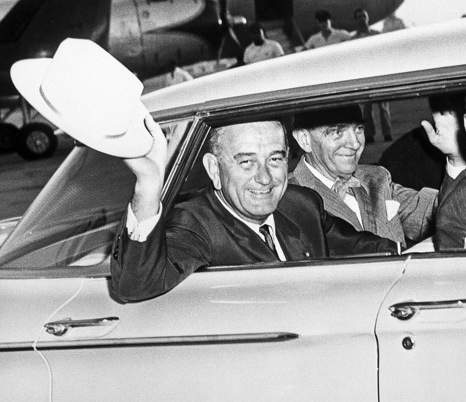The War We Lost
So, yesterday was the 50th anniversary of President Lyndon Baines Johnson’s declaration of War on Poverty.
It was one of the great moments in American history.
Loyal readers know how I feel about LBJ. He was an uncouth, bullying, macho, conniving political huckster. He also felt, deep within his heart and soul, a kinship with black human beings and poor human beings. And he acted on those empathies — for a precious moment.
LBJ
■
Had he and the Congress allowed the resultant Great Society programs to actually eliminate malnutrition, lack of education, joblessness, and all the other ills of need that bedeviled this holy land, the richest on Earth, he would have gone down as one of the greatest three or four presidents ever.
Sadly, he got, to borrow a term he often used, his pecker caught in Vietnam.
This nation decided it was far more important to prosecute an unwinnable, pointless, poorly-executed war in the Southeast Asian jungles than to help our less fortunate brothers and sisters here climb out of despair.
Now, here we are, 50 years later. The gap between rich and poor grows daily. Commentators chirp that the economy is is churning once again after the Great Recession, yet it seems the only beneficiaries are moneyed investors and Wall Street casino players. Municipalities and social and cultural institutions are starving for cash. Unemployment remains remarkably high. And far too many of the available jobs are in the service industries, paying minimum wage.
In the War on Poverty, poverty won.
Mother Jones mag yesterday ran a piece on where we are, poverty-wise, now in the United States. A trio of authors suggest we’ve both won and lost the War. If we take the authors at their word, that the result was a mixed bag, then, really, we’ve lost. LBJ himself said, in announcing the War, “… [W]e shall not rest until that war is won. The richest nation on Earth can afford to win it.”
Check out the six charts illustrating the depths of American poverty in the 21st Century. Some things have changed for the better. Some things. That’s all.
The political debate today is no nearer to revisiting the ideas of the Great Society than it is to the consideration of dumping all our currency, stocks, and bonds in a huge pile, dousing it with gasoline, and lighting a match.
Poor people, you’re on your own.
To me, that’s a losing coda.
[h/t to Susan Sandberg for pointing out the MJ mag piece.]
▼
The Big Interview
Hey, dig my interview with graphic novelist Nate Powell this afternoon on the WFHB Daily Local News.
Powell
■
It’s the first in a new series of conversations between me and people I find compelling and interesting. Each tête à tête will run as an 8-minute feature on WFHB and then as a full-out conversation in The Ryder magazine.
Powell is the illustrator of the graphic novel, March: Book One, about the life of Georgia Congressman John Lewis, who was a key figure in the civil rights movement of the 1960s. Lewis got his skull broken by an Alabama state trooper on Bloody Sunday, March 7, 1965. That was the day voting rights activists attempted to cross the Edmund Pettis Bridge at Selma but were met and routed by local and state cops.
Powell has written and drawn a number of award-winning and big-selling comics and graphic novels including Swallow Me Whole, Any Empire, and The Silence of Our Friends. He lives in Bloomington now with his wife and two-year-old daughter.
Tune in at 5:30pm or catch the podcast (after it’s put up, natch) on the station’s website. The longer Powell interview will run in next month’s Ryder.
▼
A Contrarian’s Rationalization
Loyal readers know I refuse to get a smartphone. Some folks look at me as if I’m from the moon when I whip out my trusty flip phone. I don’t care.
Yeah, a lot of it has to do with my fetish for contrarianism but, really, there’s thought behind my refusal to jump on the e-toy bandwagon.
■
Personal technology writer David Pogue laid out a good case for my narrowly-focused Luddism in last month’s Scientific American:
We all know that the cycle of electronics consumerism is broken. Because it’s an endless money drain for consumers to keep their gadgets current. Because the never ending desire to show off new features leads to bloat and complexity of design. And because all our outdated, abandoned gadgets have to go somewhere. According to the US Environmental Protection Agency, we Americans threw away 310 million electronic gadgets in 2010 alone. That’s about 1.8 million tons of toxic, nonbiodegradable waste in our landfills.
See? I’m not a total lunatic.
▲



Not so fast ya big ape, although with impeccably groomed eyebrows. You mean to tell me if we took the money we spent on Viet Nam (not in vain by the way but that’s a discussion for a later time) and spent in on the War on Poverty instead that war would have been won? I think what we have done is unintentionally created a culture of dependence where gov’t largess has replaced the need for the man at the dinner table. The best thing we did for the poor is civil rights legislation. No offense intended with the big ape crack, I needed a segue to the eyebrow line.